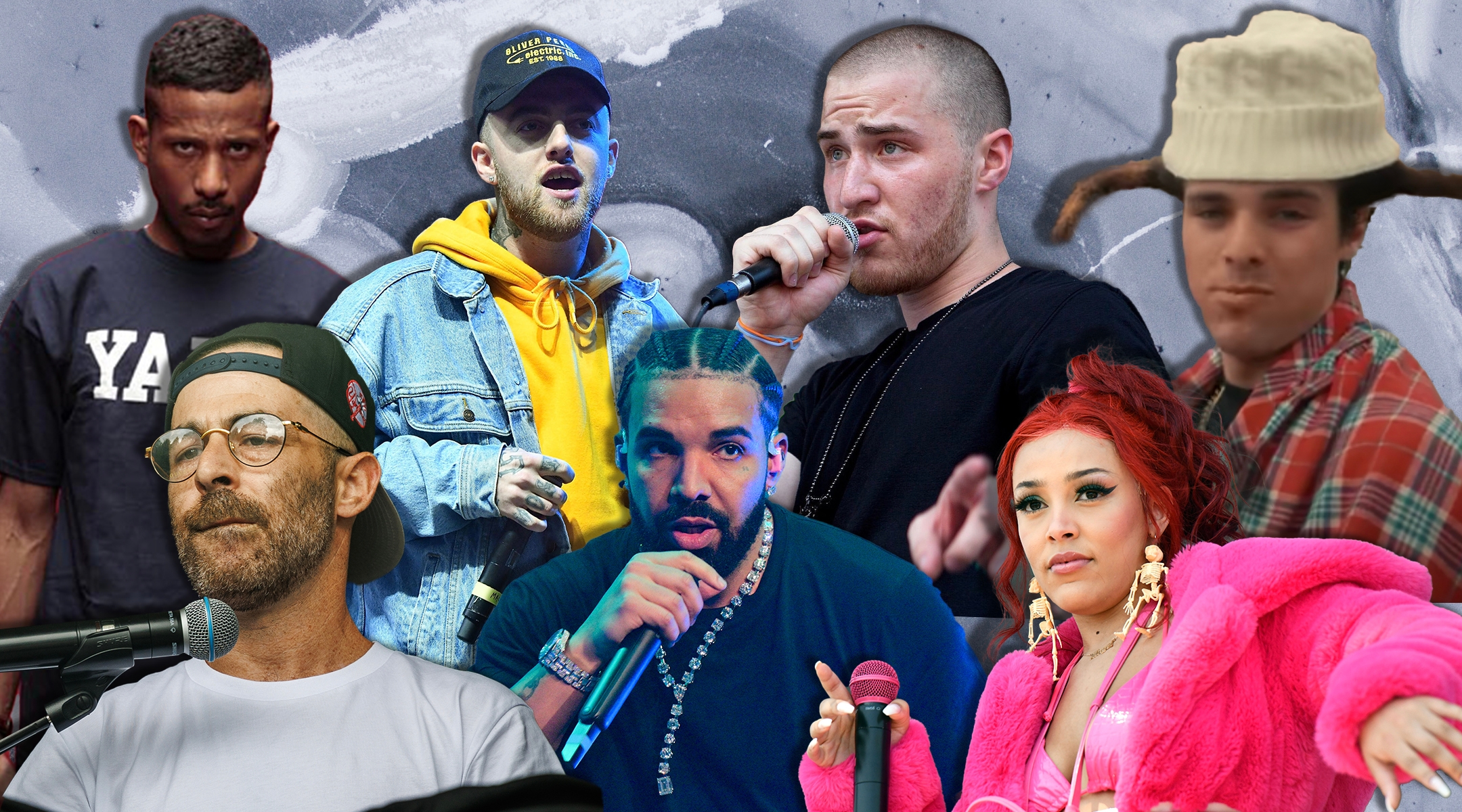(JTA) — Since the birth of hip-hop 50 years ago, plenty of Jewish rappers have picked up a microphone and rocked a crowd. They’ve spit rhymes in English, Hebrew, Yiddish, even Aramaic. Collectively, they’ve shattered stereotypes about what Jews look and sound like.
But hip-hop is hypercompetitive, so the question must be asked: Who are the Jewish artists who have made the biggest impact on the culture?
To try to answer that question, I solicited the help of some serious hip-hop heads: brothers Eric and Jeff Rosenthal, together known as ItsTheReal. They are New York City-based writers, sketch comedians and podcasters; their latest podcast, “The Blog Era,” tells the story of how anonymous kids on the internet helped obscure rappers become global superstars.
RELATED: From Rick Rubin to Doja Cat, Jews have helped shape the first 50 years of hip-hop
The rappers they chose for this list, which is organized alphabetically and actually includes 12 people (since the Beastie Boys were a trio), span generations and geographical regions. All of them have Jewish heritage, but they do not necessarily make use of it in their art. The only other traits they share, in the words of the Rosenthal brothers, are that “everyone loves hip-hop and everybody is authentically themselves.”
The Alchemist
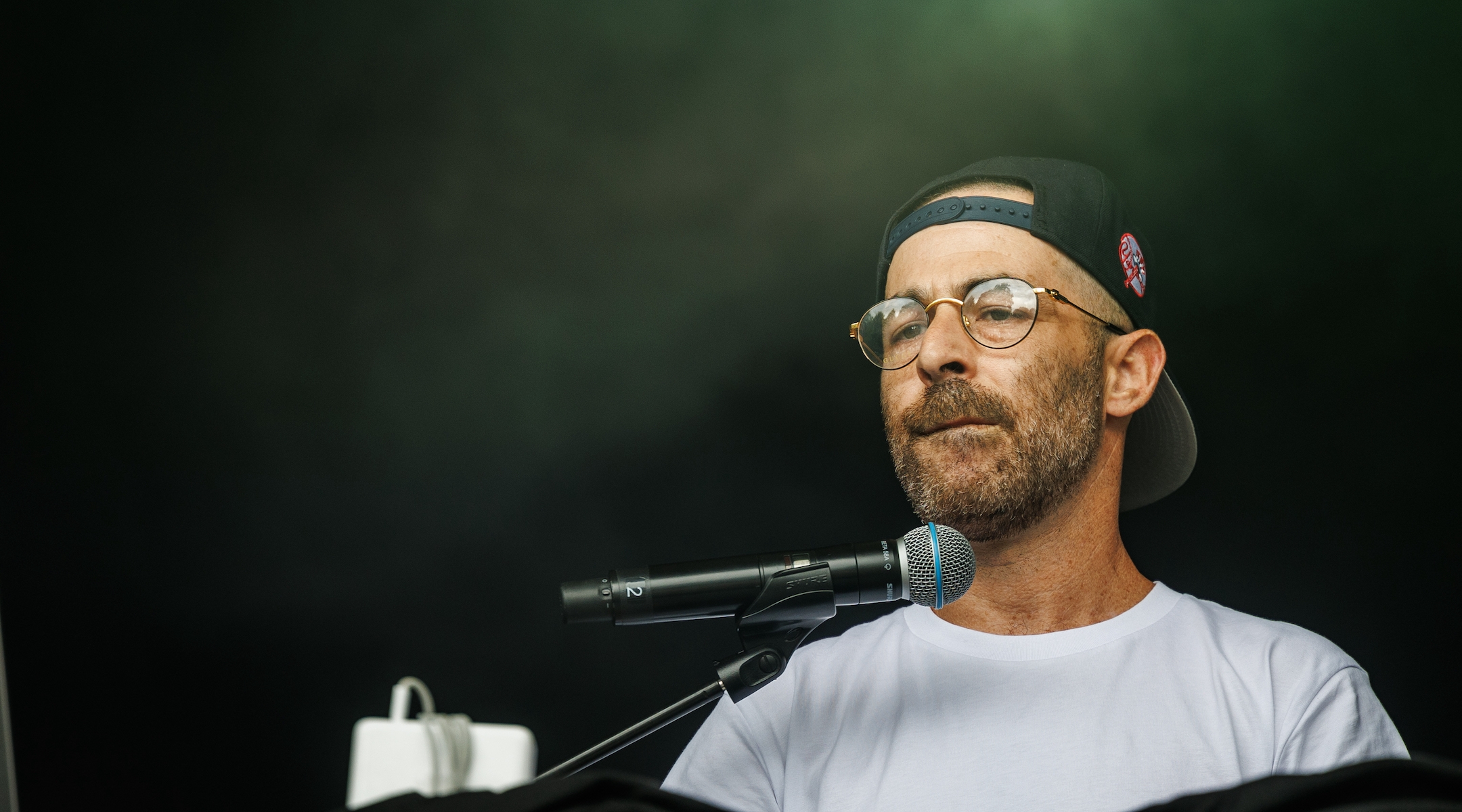
The Alchemist performs with Boldy James at a festival in Oslo, Norway, Aug. 10, 2023. (Per Ole Hagen/Redferns/Getty Images)
Background: Born Alan Daniel Maman in Beverly Hills, CA; age 45; 3 solo studio albums, 15 albums as producer
Best known for: Producing songs for Nas, Eminem, Fat Joe, Mobb Deep, Jadakiss, The Lox, Action Bronson, among others
Most Jewish moment: In 2015, he released “Israeli Salad,” an instrumental album built around samples of Israeli songs that includes a track titled “Bone Thugs N’ Haifa.”
ItsTheReal says: “Alchemist is the guy who everybody looks up to like, ‘Oh, s—, that’s an actual cool Jew in this space.’ From his dress to his attitude to the music he makes, he exudes hip-hop. He lives in an apartment with his wife and kids on the westside of L.A., making beats for fun. He’s independent and lives in that persona. His journey from teenage rapper in Beverly Hills to essential production partner in the seminal Queens group Mobb Deep is genuine and way more impactful than being put in a box of ‘Jewish rapper who makes it big and sells out in some way or another.’”
Beastie Boys
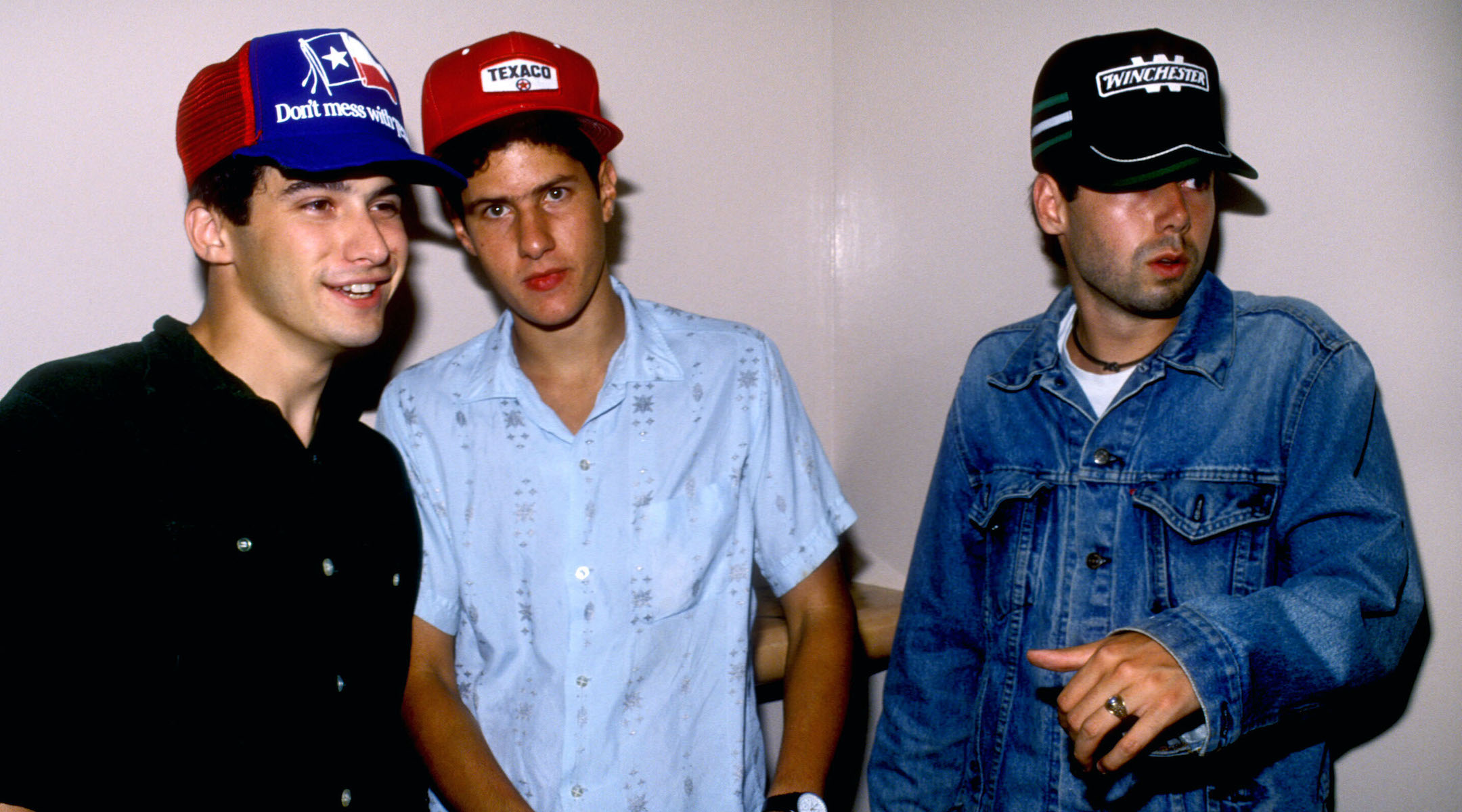
The Beastie Boys, shown in an undated photo, were early rap pioneers. (L. Cohen/WireImage/Getty Images)
Background: Core members were Michael “Mike D” Diamond, Adam “MCA” Yauch, Adam “Ad-Rock” Horovitz, all born in New York City; active from 1981 to 2012 (Yauch’s death); 8 studio albums, 3 Grammys
Best known for: “(You’ve Gotta) Fight for Your Right (To Party),” “Intergalactic,” “Sabotage,” “No Sleep Till Brooklyn”
Most Jewish moment: In “Shadrach,” a song on their 1989 album “Paul’s Boutique,” the Beastie Boys compare themselves to Shadrach, Meshach and Abednego, three Jewish men who defied Nebuchadnezzar II, king of Babylon, in the Book of Daniel.
ItsTheReal says: “The Beastie Boys are the blueprint. They came from a punk background. They were hanging out with Rick Rubin, and shifted their love of punk and anti-authoritarianism across cultural lines. They’re notable for being early, obviously, and being part of that blueprint, but also for taking hip-hop into such weird and crazy places, fusing it with skate life and being progressive heroes.”
BLP Kosher
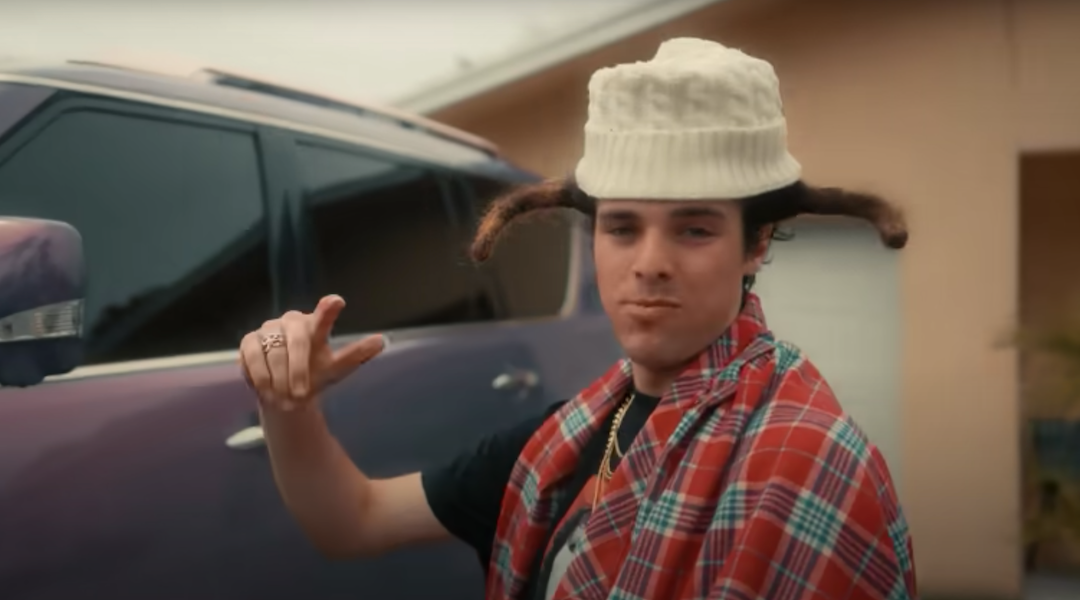
BLP Kosher in his music video for “The Nac 3.” (Screenshot from YouTube)
Background: Born Benjamin Landy Pavlon in Broward County, Florida; age 23; begins a national tour (“The Dreidel That Never Stopped Spinning Tour”) in September
Best known for: “Special K,” “Jew on the Canoe,” his unique hairstyle (a combination of Orthodox Jewish and Haitian styles)
Most Jewish moment: Every part of his rap persona references Jewish culture, from his MC name, to his nickname (“Dreidel Man”), to the Star of David necklaces he’s always wearing, to the title of his new album, “Bars Mitzvah.”
ItsTheReal says: “BLP Kosher is the future. He doesn’t have a huge catalog. I don’t know who his music is for, or who the joke is supposed to be on, if there is a joke. Honestly, he seems sincere, so give him the benefit of the doubt. But his existence flies in the face of every other trend. We live in a time now where there are a lot of stereotypes, antisemitism, and violence, and for him to be proudly and outwardly Jewish, to be accepted by the rougher edges of Florida and to be out there on a stage calling yourself that, I respect that.”
Doja Cat
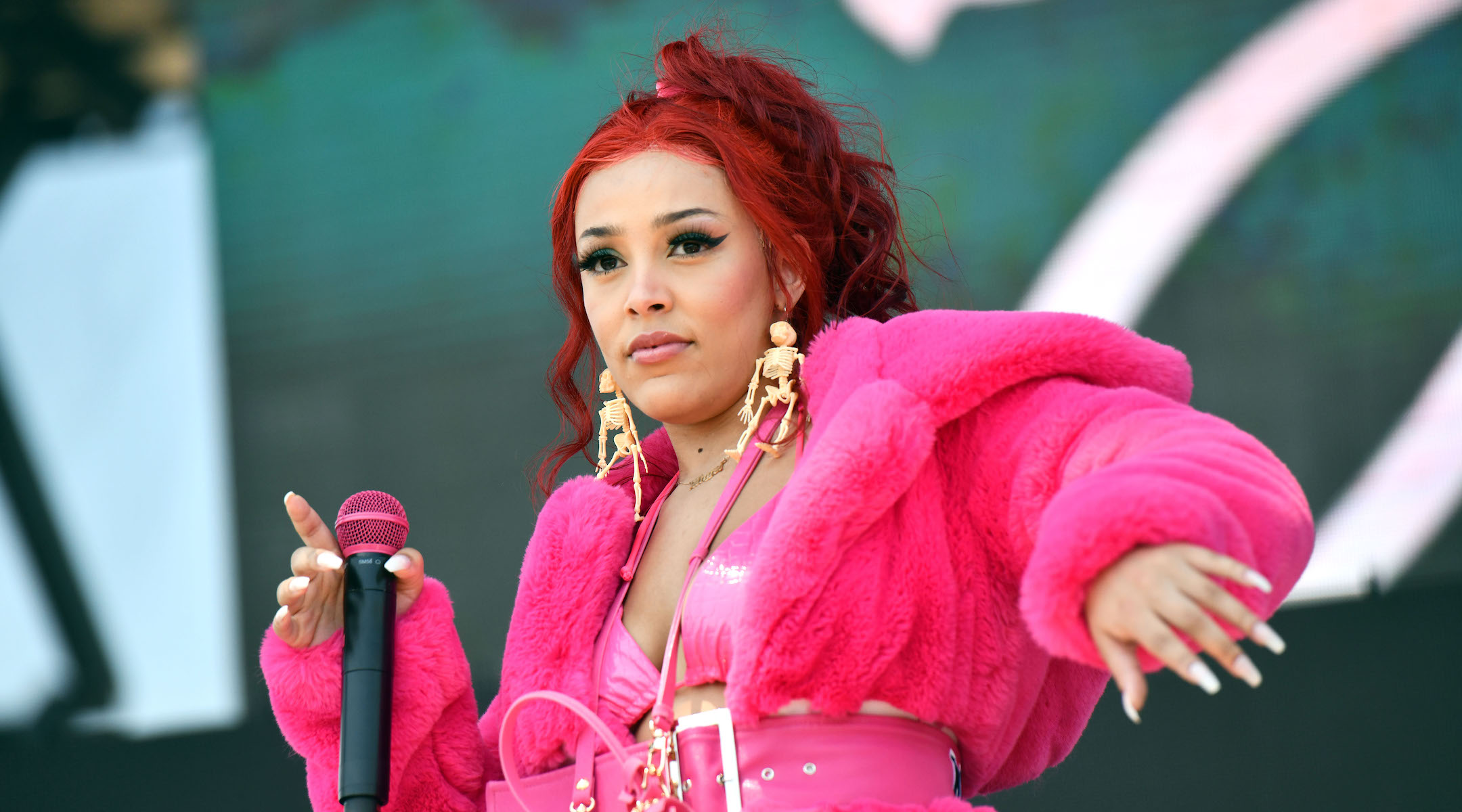
Doja Cat performs at the Honda Center in Anaheim, Calif., Aug. 11, 2019. (Scott Dudelson/Getty Images)
Background: Born Amala Ratna Zandile Dlamini in Los Angeles; age 27; Ashkenazi Jewish and South African heritage; 3 studio albums; in the top 50 most streamed artists in the world on Spotify
Best known for: “Say So,” “Get Into It (Yuh),” “Mooo!” and her combative social media persona
Most Jewish moment: In an episode of season 2 of the FX series “Dave,” the character played by Jewish rapper Lil Dicky matches with a character played by Doja Cat on a dating app. His father asks if she’s Jewish, and he confirms that she is after consulting her Wikipedia entry.
ItsTheReal says: “There’s a small number of Jewish rappers who have broken through, and there’s an even smaller number of Jewish women who rap. There’s a Jewish stereotype where you get painted as not tough, but Doja is extremely tough, brazen, confident. She is somebody who has built up this massive audience and isn’t afraid to lose them if they don’t follow her lead. That’s brave. That’s exciting. That’s very punk. Two spaces she occupies, L.A. and pop music, can be so soulless, but she is bringing a realness to both.”
Drake
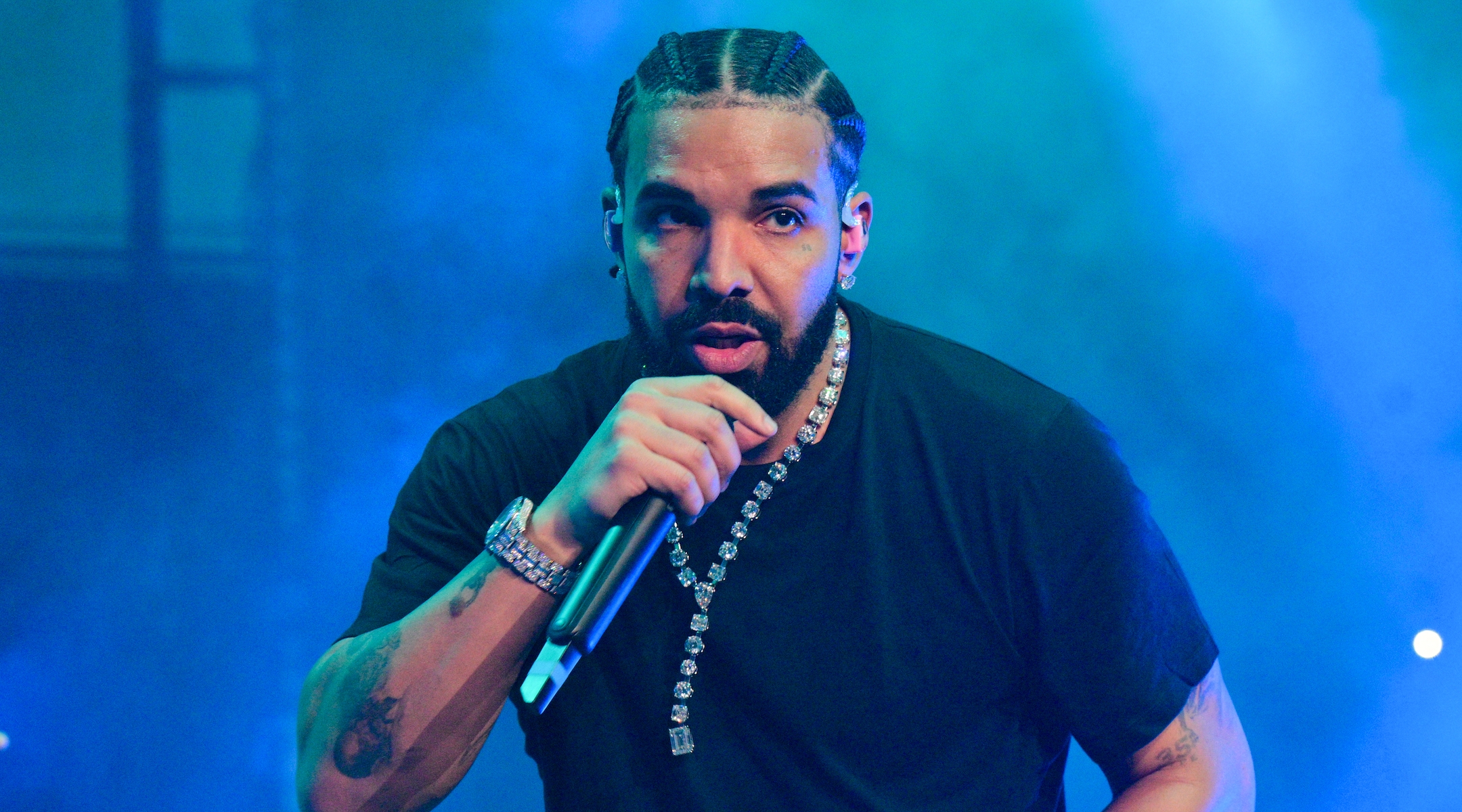
Drake performs at the State Farm Arena in Atlanta, Dec. 9, 2022. (Prince Williams/Wireimage/Getty Images)
Background: Born Aubrey Drake Graham in Toronto; age 36; Ashkenazi Jewish and African American heritage; former child actor on “Degrassi: The Next Generation”; 8 studio albums, 5 Grammys; Spotify’s most streamed rapper, with more than 72 million monthly listeners
Best known for: “Hotline Bling” (1.9 billion views on YouTube), “God’s Plan” (1.5 billion views), and dozens of other hits
Most Jewish moment: It’s a tie between his 2014 SNL skit, “Drake’s Bar Mitzvah,” and his music video for “HYFR (Hell Ya F— Right),” which was filmed inside Miami’s Temple Israel.
ItsTheReal says: “He’s from Toronto, Canada, he’s half singing, half rapping, and he’s Jewish. Those are all these things that are traditionally outsider-ish. And for him to come on the scene, for him to be accepted the way that he has, and for his music to cross over and become as dominant as it has — that’s a testament to who he is. He weaves his Jewish identity and his sense of humor into his videos and his output in a very smart way. Today, Drake is still the goofy, fun-loving, boastful half singer, half rapper that he was at the very beginning.”
El-P
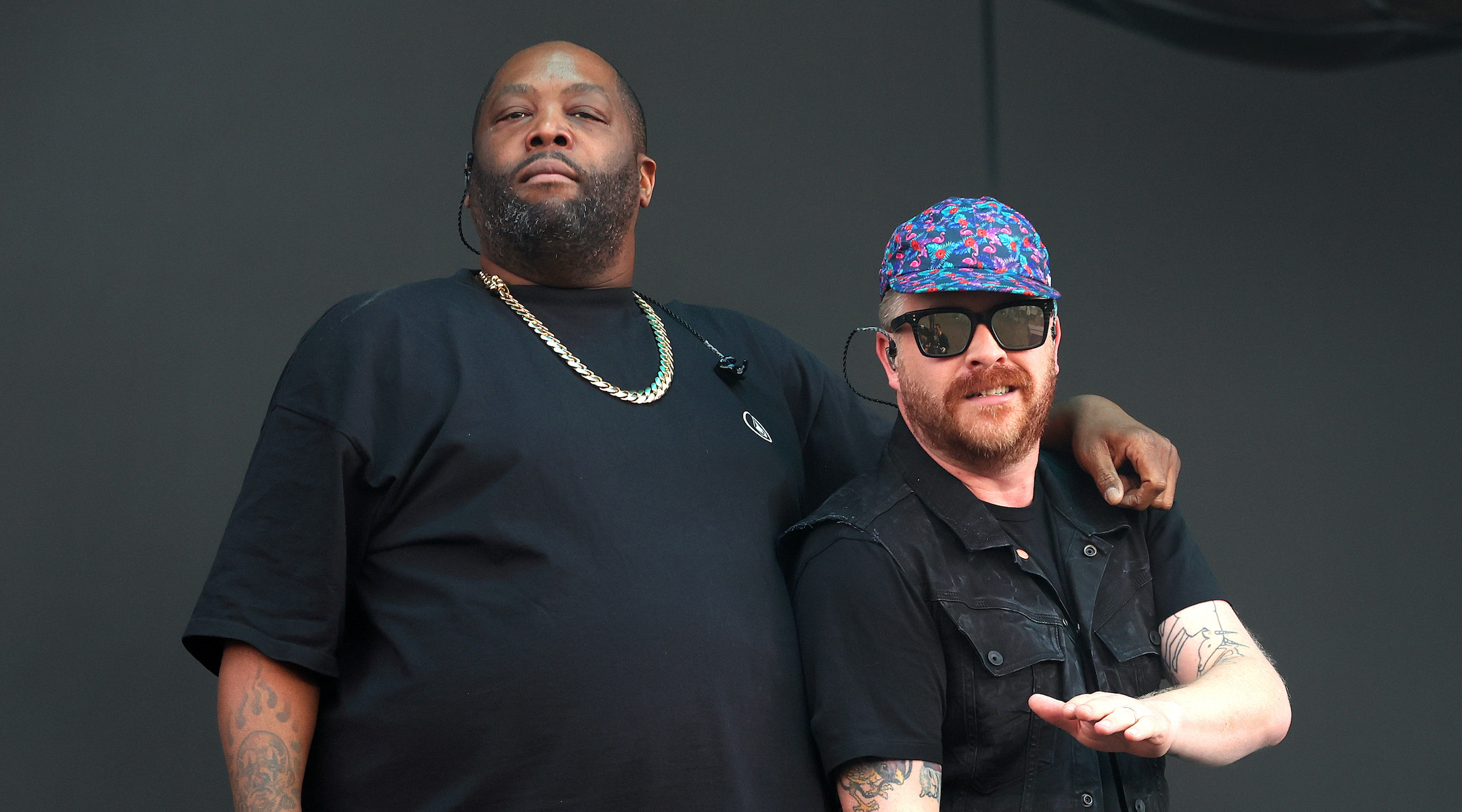
El-P, right, performs with Killer Mike as Run The Jewels at the Reading Festival in Reading, England, Aug. 28, 2022. (Simone Joyner/Getty Images)
Background: Born Jaime Meline in New York City; age 48; 3 solo studio albums, 2 albums with rap trio Company Flow, 4 albums with duo Run The Jewels
Best known for: “Legend Has It,” “Ooh LA LA,” producing songs for a variety of artists
Most Jewish moment: He has said he “grew up loving Jewish deli food” and was an investor in Frankel’s, a deli in Brooklyn that opened in 2016.
ItsTheReal says: “His whole movement is about independence: independent record label, not going along with the mainstream, really concerned with staying true to who he is. That influence is so much greater than any of his solo albums or any of his work in Run The Jewels, which by the way has been super successful. Today, with so many people doing it on their own, because now technology has caught up — you can record music on your own, you can distribute it on your own, you can publicize it on your own — there’s a lot more stuff that El-P was early on that you see the influence of today.”
Mac Miller
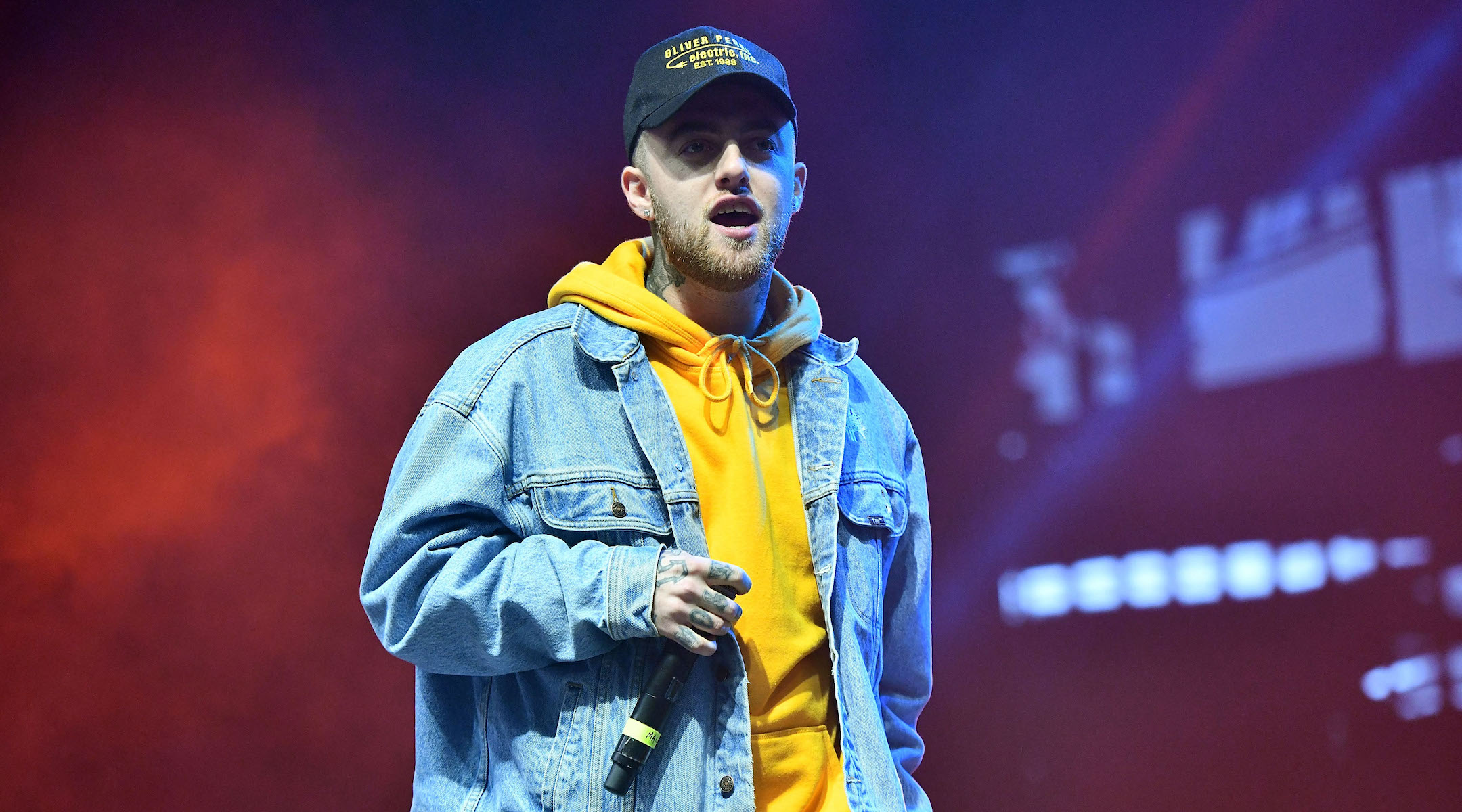
Mac Miller performs in Long Beach, California, April 29, 2018. (Scott Dudelson/Getty Images)
Background: Born Malcolm James McCormick in Pittsburgh; died of a drug overdose in 2018 at age 26; 6 studio albums; Spotify’s 19th-most-streamed rapper
Best known for: “Self Care,” “Best Day Ever,” his 2018 Tiny Desk concert (which has 105 million views)
Most Jewish moment: In a 2010 interview with his hometown Jewish newspaper, the Pittsburgh Jewish Chronicle, he talked about his “chai” tattoo and said the best Hanukkah present he ever received was a keyboard. “But the worst, and every Jew can relate to this, was being all excited to open up the present, thinking it’s going to be something big, and it’s socks,” he said.
ItsTheReal says: “He was a generational talent, and there’s a reason why he’s been lionized, and it’s not only because of his death. At the beginning of his career he was looked at with skepticism because he’s a white rapper, a frat rapper, and he lived in that world. But he didn’t want to. Much like the Beastie Boys — whom Mac studied, just like he did Biggie and DJ Premier — he evolved. He decamped to L.A. and forged a tight and genuine community. His home became the hub for an emerging sound: Kendrick Lamar, ScHoolboy, Odd Future. Everybody wanted to work with him because he was talented and true. He used his powers for good.”
MC Serch
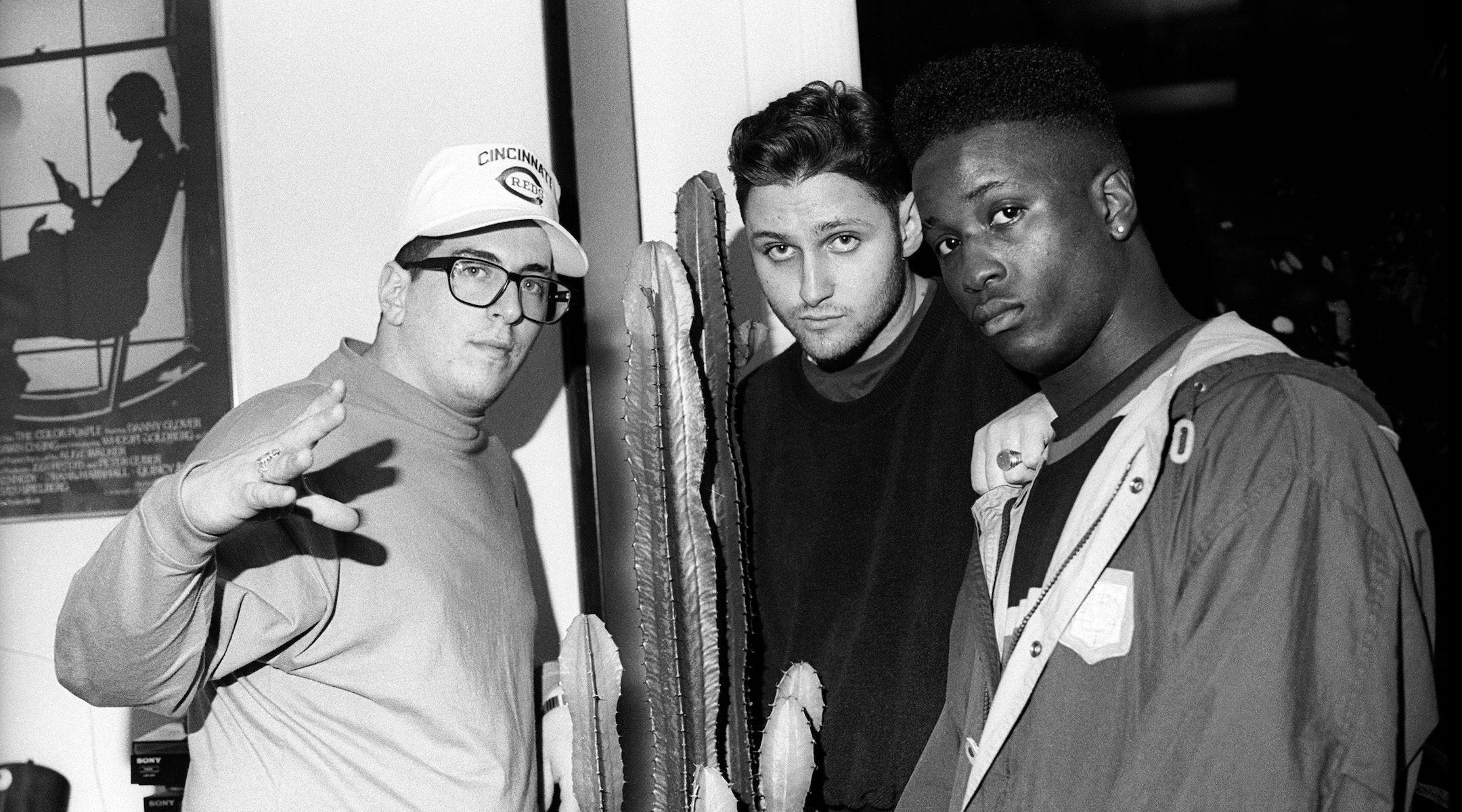
MC Serch, left, with the other members of 3rd Bass in New York City in 1989. (Al Pereira/Getty Images/Michael Ochs Archives)
Background: Born Michael Berrin in New York City; age 56; 1 solo studio album, 2 studio albums with rap trio 3rd Bass (with Pete Nice and DJ Richie Rich)
Best known for: “The Gas Face,” “Pop Goes the Weasel” (a 3rd Bass diss against Vanilla Ice), “Back To The Grill,” executive producing the classic Nas album “Illmatic”
Most Jewish moment: In a 2018 VLADTV interview, he talked about growing up in a Conservative family in the heavily Jewish Far Rockaway neighborhood of Queens. He recalled how he was asked to perform the duties of a Shabbos goy for his Orthodox neighbors. “To ask another Jew to break Sabbath because you don’t see them as being Jewish enough, it’s crazy foul,” he said. “I didn’t know until later that’s lashon hara, that’s crazy.”
ItsTheReal says: “White groups were so rare back then [in the late 1980s]. The Beastie Boys were the white crew, and then 3rd Bass showed up and they became the cool, white Jewish guys. Even more than the Beastie Boys, MC Serch lived all the early elements of hip-hop culture. He could battle somebody in a cypher and get busy on a dance floor. He’s gone on to have this career in lots of different lanes, including television and radio and as an executive, helping put Nas on.”
Mike Posner
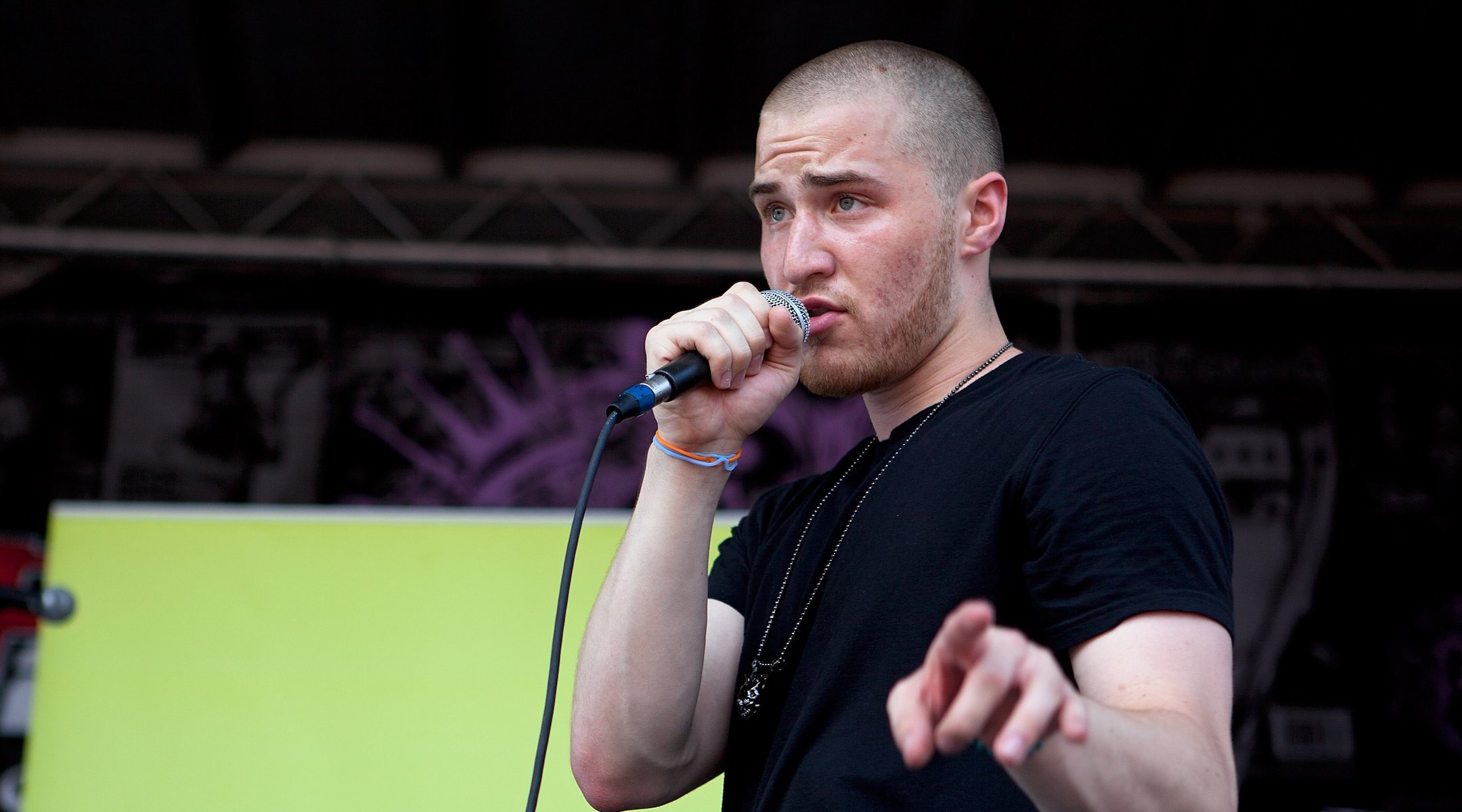
Mike Posner performs in Cleveland, July 8, 2010. (Joey Foley/Getty Images)
Background: Born Michael Robert Henrion Posner in Detroit; age 35; 4 studio albums
Best known for: “I Took A Pill In Ibiza” (a remix of which has been streamed 1.7 billion times on Spotify); “Cooler Than Me”; writing songs for Justin Bieber, Maroon 5, and Big Sean, among others; walking solo across the continental United States “to remind people your life is now”
Most Jewish moment: During his Walk Across America in 2019, he told the Detroit Jewish News that his bar mitzvah speech was about the role Jews played during the civil rights movement.
ItsTheReal says: “Mike’s path was as unique as his sound — one that grew out of freestyling with his childhood friend Big Sean and turned into a rap/singing hybrid — and it hit at the right time. He was booked at college after college and earned such a loyal fan base. Unsurprisingly, Mike Posner copycats turned up by the dozens not long after. He wrote songs for a lot of people that he didn’t get recognized for, and his musical influence can still be heard today.”
Shyne
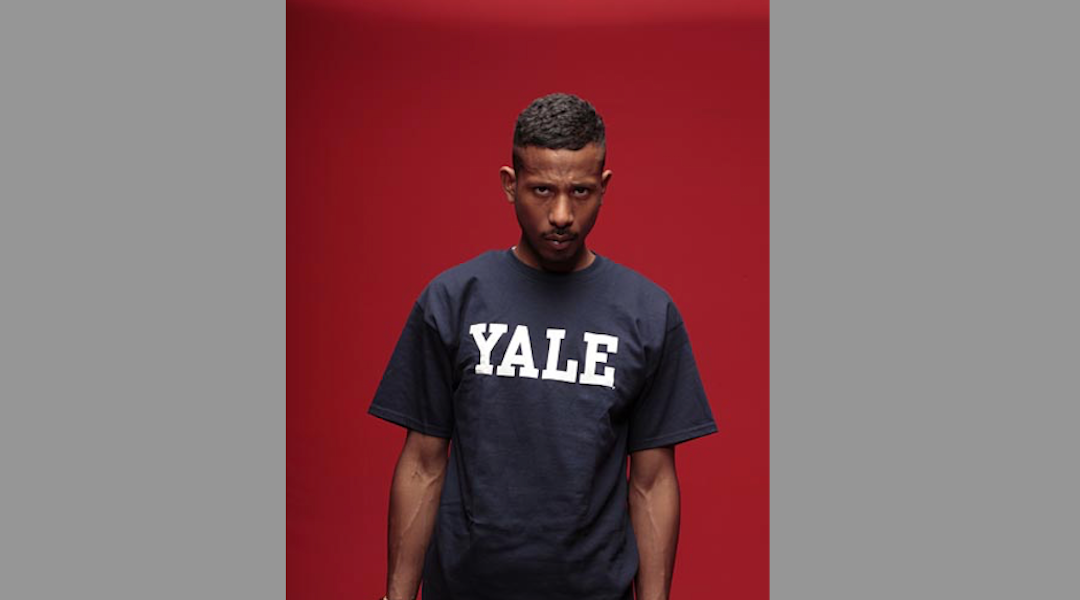
Shyne, born Jamaal Barrow, now serves in the Belize House of Representatives. (Royal Shyne/Flickr)
Background: Born Jamaal Barrow in Belize, he legally changed his name to Moses Michael Levi Barrow after converting to Orthodox Judaism in 2010; age 44; 2 studio albums; currently serves in the Belize House of Representatives
Best known for: “Bad Boyz,” his gravelly voice, his involvement in a 1999 nightclub shooting that resulted in his serving 9 years in prison
Most Jewish moment: Telling The New York Times in a 2010 interview in Jerusalem, where he was living at the time, “My entire life screams that I have a Jewish neshama [soul]” and “There’s nothing in the Chumash [text of the Torah] that says I can’t drive a Lamborghini.”
ItsTheReal says: “What a voice, what an attitude, what a swagger. He was sent to jail at the height of his superstardom. It’s hard to know how anyone could bounce back from that, evolve, reset. For Shyne, at life’s most trying intersection, he found Judaism. After he converted, there were lots of jokes — we made a lot of them — because it was so unlikely. But jokes aside, there’s no question that Shyne is the best Jewish rapper of all time.”
JTA has documented Jewish history in real-time for over a century. Keep our journalism strong by joining us in supporting independent, award-winning reporting.
